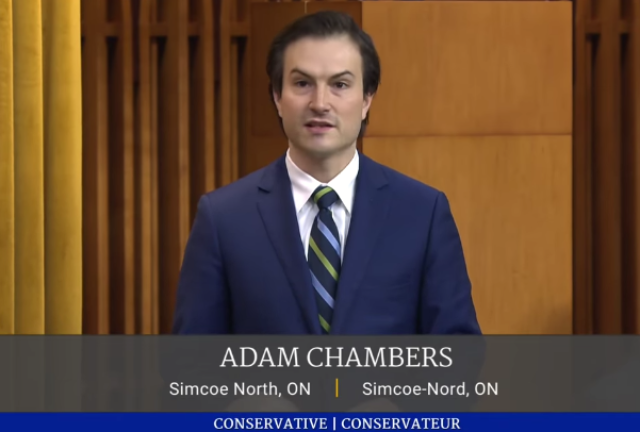Canada is quickly becoming a world leader in a rather unenviable category.
Money laundering is out of control in the country and needs to be addressed as quickly as possible by adding greater penalties and better safeguards to stop it from happening in the first place, according to Simcoe North MP Adam Chambers.
“Canada is a money-laundering paradise,” said Chambers, who is also the Conservative’s deputy shadow minister for finance. “We need a national inquiry to change that. Canada is one of the primary destinations in the world for global criminals to clean their money."
Chambers has introduced a private member’s bill in the House of Commons, which seeks to toughen Canada’s stance on white-collar criminals and so-called snow-washing, a term coined to refer to money laundering in Canada.
According to Chambers’ research into the issue, more than $100-billion is moved through Canada every year. He's also started a petition to encourage the government to act quickly against money laundering.
"Global criminals are flocking to Canada to wash their dirty money," he said. "They know our laws are weak and money washed in Canada is easy to move around the world. If you look at white-collar crime, we convict very few. The rates of convictions and prosecutions are significantly low."
If adopted, Chambers’ bill would amend the Criminal Code to make it an offence to provide false information to a person or entity (such as banks and credit unions) listed in section 5 of the Proceeds of Crime (Money Laundering) and Terrorist Financing Act about the identity of a person or entity, including the corporate structure. Those who violate the law could face a prison term of up to 10 years and/or a fine of up to $1-million.
Chambers said money laundering makes Canadian communities more dangerous and drives up real estate prices across the country while supporting criminal acts like drug trafficking, human trafficking and terrorist financing.
“The government needs to act, so we can hold white-collar criminals accountable,” he said, noting that besides a national inquiry, Canada needs laws that force criminals to make it clear what they own and punish those who aid them along with ensuring law enforcement agencies have the necessary tools to take down money launderers..
"In my view, this is a non-partisan issue. We should all be working on this issue together. These changes will help bring an end to the party for global criminals and make criminals think twice before they wash their dirty money in Canada."
According to Chambers, Transparency International (TI) Canada, a leading organization on corruption and transparency, has reported that Canada has garnered a reputation as an easy jurisdiction for national and international criminals to launder money.
“The scale of money laundering in Canada is staggering and its impact in Canada by laundering proceeds of illicit activities and driving up real estate prices for all Canadians,” he said.
“Criminals rely on dozens of people to launder their money. This bill will make their life more difficult and make it easier for authorities to hold criminals accountable for their actions.”
Chambers has also elicited support for the bill, which he expects will be debated and voted on in the House of Commons this fall.
“We are pleased to see the proposal of this bill that fits in with increasing attention and efforts in Canada to fight money laundering and end our national reputation for ‘snow-washing,’” James Cohen of TI Canada said in a statement provided by Chambers.
“This proposed amendment can be a crucial tool in closing one of the many gaps that have been exploited by kleptocrats, tax cheats and their enablers. TI Canada hopes to see all parties come together to move this proposal forward.”
In a recent CD Howe Intelligence Memo, Kevin Comeau, a lawyer and a member of TI Canada's working group on beneficial ownership, challenged the country’s “weak” anti-money laundering laws that “have enabled corrupt politicians, criminals and tax cheats from around the world to launder billions of dollars in Canadian real estate without disclosing the true owner.”
“Under our present anti-money-laundering rules, financial institutions and designated non-financial businesses and partnerships (Reporting Entities) are legally required to collect and verify the identity information of their clients. Reporting Entities failing to do so are subject to sanctions,” Comeau wrote, referring to beneficial ownership, which allows someone to enjoy the benefits of ownership even though the title to some form of property is in another name.
“But clients who provide false beneficial-ownership information are not. The federal government can reduce these risks by enacting legislation attaching sanctions to false reports of beneficial ownership made to persons who are legally required to collect that information.”
Added Chambers: "I think there are a lot of things happening in this country that we have to get right. We have to make sure Canada isn't seen as a great place for money laundering."



